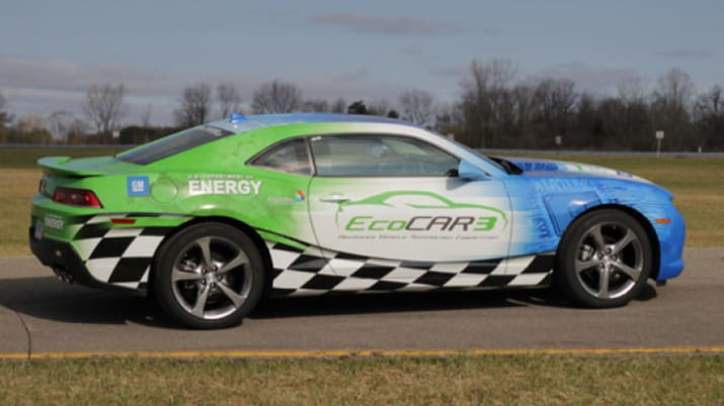Figuring out a way for a hybrid powertrain to co-exist with the performance expectations of a classic American muscle car is a challenge that could vex that most experienced of automotive engineers. It's a challenge, in fact, being handed to a bunch of college students.
Over the next four years, students from 16 North American colleges and universities will attempt to wring fuel efficiency from a 2016 Chevy Camaro as part of EcoCAR3, an advanced-vehicle technology competition sponsored by the Department of Energy, General Motors and others.
They'll be attempting to use hybrid or plug-in hybrid technology while not sacrificing the performance of the Camaro, which was selected in part because the current model achieves just 17 miles per gallon in city driving and 28 MPGs on the highway, per EPA numbers. Students will get the latest version of the vehicle to work on, one that is expected to be unveiled next month on Belle Isle in Detroit.
"If we still want to produce V8 Camaros, we're going to have to look at alternative methods of propulsion," said Al Oppenheiser, the chief engineer on the Camaro. "So the ideas that these college teams come up with could very easily be adapted to a car like the Camaro."
Unlike similar competitions that reward fuel efficiency in vehicles, EcoCAR seeks those gains while emphasizing cost and consumer acceptance of these vehicles. The cars shouldn't look like experiments; they should look like everyday vehicles on the road.

Previous competitions have allowed the teams to use whatever powertrain they desired. This time, EcoCAR officials designed the competition to concentrate on hybrid, hybrid-electric and diesel options. Competitors won't have the option of using hydrogen fuel cells as they have in the past. Last year, a team from Colorado State built a vehicle that contained both hydrogen and electric power sources.
This year's limit is a curious choice, as some automakers such as Toyota have placed heavy bets on fuel cells in recent years. General Motors also runs a fuel-cell program. With the focus on cost and practicality, however, the program officials wanted to narrow the framework of the contest.
"We always have some good decisions on what to make within the scope or out of scope," said Jim Kolhoff, global director of software engineering for General Motors. "We did what we think will deliver the best competition while still providing room for teams to innovate."
Innovation is another key theme in this latest competition. Officials are asking teams to identify specific breakthroughs as they design their cars and those will be incorporated into the scoring of the competition.
"We've tried to leave it pretty open, so teams and students can choose topics they think are new or are excited about," Kolhoff said. "This is a good way to balance performance targets of the real world and also show that you can innovate in the same arena on the car."
Students will begin work on their cars this fall.
Related Video:
Over the next four years, students from 16 North American colleges and universities will attempt to wring fuel efficiency from a 2016 Chevy Camaro as part of EcoCAR3, an advanced-vehicle technology competition sponsored by the Department of Energy, General Motors and others.
They'll be attempting to use hybrid or plug-in hybrid technology while not sacrificing the performance of the Camaro, which was selected in part because the current model achieves just 17 miles per gallon in city driving and 28 MPGs on the highway, per EPA numbers. Students will get the latest version of the vehicle to work on, one that is expected to be unveiled next month on Belle Isle in Detroit.
"If we still want to produce V8 Camaros, we're going to have to look at alternative methods of propulsion," said Al Oppenheiser, the chief engineer on the Camaro. "So the ideas that these college teams come up with could very easily be adapted to a car like the Camaro."
Unlike similar competitions that reward fuel efficiency in vehicles, EcoCAR seeks those gains while emphasizing cost and consumer acceptance of these vehicles. The cars shouldn't look like experiments; they should look like everyday vehicles on the road.

Previous competitions have allowed the teams to use whatever powertrain they desired. This time, EcoCAR officials designed the competition to concentrate on hybrid, hybrid-electric and diesel options. Competitors won't have the option of using hydrogen fuel cells as they have in the past. Last year, a team from Colorado State built a vehicle that contained both hydrogen and electric power sources.
This year's limit is a curious choice, as some automakers such as Toyota have placed heavy bets on fuel cells in recent years. General Motors also runs a fuel-cell program. With the focus on cost and practicality, however, the program officials wanted to narrow the framework of the contest.
"We always have some good decisions on what to make within the scope or out of scope," said Jim Kolhoff, global director of software engineering for General Motors. "We did what we think will deliver the best competition while still providing room for teams to innovate."
Innovation is another key theme in this latest competition. Officials are asking teams to identify specific breakthroughs as they design their cars and those will be incorporated into the scoring of the competition.
"We've tried to leave it pretty open, so teams and students can choose topics they think are new or are excited about," Kolhoff said. "This is a good way to balance performance targets of the real world and also show that you can innovate in the same arena on the car."
Students will begin work on their cars this fall.
Related Video:


Sign in to post
Please sign in to leave a comment.
Continue